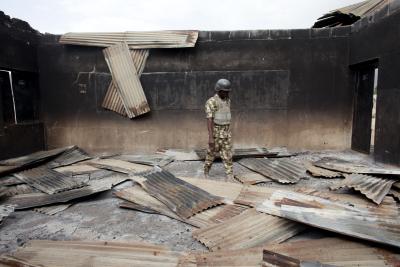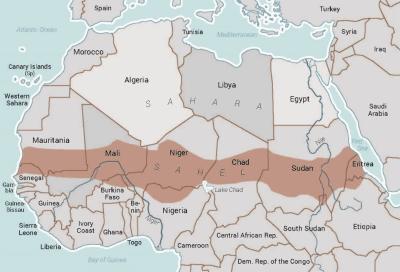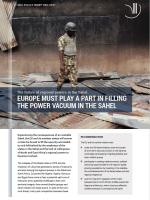Europe Must Play a Part in Filling the Power Vacuum in the Sahel

■ under the G5-Sahel initiative, share the burden of short-term security provision in the Sahel by continually participating in fighting jihadists and other militant groups
■ participate in creating viable economic, political and social opportunities for the region’s rapidly growing populations by investing in the stabilization and development of the Sahel states and their regional neighbours
■ push for long-term regulation of the rivalry between East or North African middle powers like Algeria and Morocco, which obstructs effective conflict-resolution in and beyond the Sahel
Experiencing the consequences of an unstable Sahel, the EU and its member states will sooner or later be forced to fill the security and stability void left behind by the weakness of the states in the Sahel and the lack of willingness of North and East Africa’s regional powers to become involved.
The collapse of the Malian state in 2013 and the implosion of Libya has generated a sense of insecurity and alert among the regional powers in the Sahel and North Africa. Countries like Nigeria, Algeria, Morocco and Egypt have come to fear a potential spill-over of insecurity and a potential challenge to their own territorial integrity from armed jihadist groups and other militant non-state actors. In spite of the common threat, rivalry and competition between these regional powers have hindered the creation of effective regional leadership and consequently the establishment of security and order. Facing the consequences of this development in the form of increased migration flows and attacks by global jihadists originating from the Sahel or North Africa, the EU must consider helping to fill the security voidin the region.
The lack of regional collaboration
The 2015 establishment of a territorial outpost of the Islamic State in Sirte on Libya’s northern coast sparked fears that the Sahel and North Africa couldin the near future experience challenges to their regional security like those experienced by the Middle East over the past five years. However, experts who initially aired hopes that the regional powers in and around the Sahel would re-establish a functioning regional order and stability in the wake of theretrenchment of US power and the end of the bipolar world order, as seen in other parts of the globe, have been disappointed.
Algeria, the region’s undisputed military powerhouse, has persistently declined to become involved in the crises in Mali and Libya. Rather than intervening and re-establishing order in its collapsing neighbours, Algeria made no move when jihadist groups gained a foothold in northern Mali and Libya. In 2012 and 2013, this attitude rebounded on Algeria in the form of renewed threats to its vital oil and gas exploitation sites in the Sahara and the potential spilling over of separatist ambitions among its domestic Tuareg population groups in the Tamarasset region. Nonetheless, while beefing up its domestic security and border control, Algeria has continued to abstain from acting decisively beyond its national borders.
Given its geographical proximity to North Africa and the Sahel, European powers cannot affordsecurity in the Sahel region to collapse.
Morocco, the emerging economic power in Africa and the Sahel, has remained active, but its efforts do little to fill the security void or re-establish stability and order in the region. Rather than supporting failing states like Mali and Libya in handling the immediate security challenges from jihadists and militant separatists, Morocco has aimed to increase its role in the Sahel primarily through soft power initiatives. For instance, it has invested in educational programs targeting imams in Mali and has sought to counter the jihadist mobilization by promoting non-violent interpretations of Islam. It has also invested in industry and media development in the region. Although the Moroccan answer is relevant in the long run, it is missing the target when it comes to short-term security provision.
Further south, since the mid-2000s the Nigerian military’s campaigns against Boko Haram facilitated a further degeneration of regional security in the Sahel by pushing jihadist groups to establish safe havens outside Nigeria in the Lake Chad region, northern Cameroon and Niger.
Finally Egypt, Africa’s second largest military investor (surpassed only by Algeria), has narrowly pursued its own national interests in seeking to handle the threats and challenges emerging from the collapse of order in Libya after the fall of Muammar Gaddafi and the subsequent establishment of an outpost of Islamic State in the country. Bogged down by its own internal transition after the fall of Hosni Mubarak and the subsequent repression of a full-scale rebellion in Sinai, Egypt has adopted a limited strategy in Libya of supporting its own proxy, the militia leader Khalifa Haftar, in an attempt to stabilize the country’s border region and block jihadist infiltration from Libya.

Rivalry blocks regional solutions
Although facing severe security threats, the regional powers in North and East Africa have thus proved incapable of producing a coherent and efficient regional response. By narrowly pursuing national security interests rather than regional solutions, they have sacrificed the regional peace and dialogue initiatives launched by the African Union, the Arab League and the United Nations that aim to institutionalize the conflicts. From the Libyan conflict to the Malian crisis via the struggle against Boko Haram, the rivalry and competition of the regional powers have rendered them incapable of producing regional security and order.
Rivalry and competition among the regional powers have rendered them incapable of producing regional security and order.
The longstanding rivalries between Algeria and Morocco over hegemony in North Africa, which for decades has deadlocked peace initiatives in the Western Sahara, remain a key obstacle, and over the past five years they have undermined several regional peace initiatives in Mali. Often this has happened through a proliferation of “dialogues” and “peace initiatives” that simultaneously exclude rivals and neutralize alternative dialogues and peace initiatives. Thus, the proliferation of such initiatives has itself become part of the problem.
- The growth of jihadist groups and other types of militant actors
- The increase in migration and refugee flows from the Sahel and North Africa
- The persistence of rivalry between the great powers of the region

